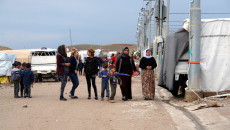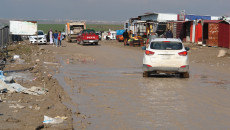The IDPs of Shingal (Sinjar) district residing camps in Duhok Northern Province refuse to return to their homes, unless their destroyed homes are rehabilitated and basic services such as water, electricity and roads are restored.
The demands of the displaced coincide with the efforts of the local administration in Nineveh to return all the displaced to their areas. Najim al-Jibouri, the governor of Nineveh, arrived in Shingal on February 28, and met with the security authorities to facilitate the process of returning the displaced.
There are about 665,000 Internally Displace Persons IDP in Iraqi Kurdistan region out of which 30% are Ezidis, shows the figures by the Joint Crisis Coordination Center JCC of Kurdistan Regional Government’s KRG ministry of interior.
Shingal, located 120 west of Mosul, on the border of Iraq-Syria, is home to the Ezidi minority targeted by Islamic State (IS) group in August 2014 and one of the disputed territories between Baghdad and Erbil.
Seized in August 2014 by ISIS militants whom accused the Ezidis of being “heretics,” Shingal has been the scene of tragedy: a genocidal campaign of killings, rape, abductions and enslavement, amounted to genocide lately acknowledged by parliaments of Belgium and Netherlands.
The surviving community fled to safer-heaven IDP camps on Shingal Mount and in the adjacent northern Kurdistan region where tens of thousands still live in tens of camps for Internally Displaced Person IDP.
Thousands of Ezidi women, girls and kids were enslaved and taken as sex slaves. KRG office for rescue of missing Ezidis says 6,417 Ezidis were enslaved by IS when it took over Shingal in 2014 and 2,700 of them have been brought to unknown destiny.
Mallo Shammo, an IDP from Shingal district who lives in Bajid Kendala camp in Simel district of Dohuk, said, "Let them repair the houses, streets and public places, before they ask us to return, then we will undoubtedly return."
Criticizing the government’s efforts, Shammo said, “They made dozens of promises regarding service projects, but all of those promises were ink on paper...Go and look at Shingal and compare it to what it was before ISIS came. You will not recognize it because of the severity of the destruction it inflicted so where to people should go back?"
Local officials claim the security situation is stable and under control in Shingal. End of last year, the Iraqi government decided to allocate an amount of 28 billion dinars (20 million USD) for the reconstruction of Shingal, for which the local administration of Nineveh formed a special committee to oversee how to spend the budget.
hundreds of billions have been spent over the past years and nothing has changed
"What can be done with 28 billion dinars? This is not even enough to restore a few streets, hundreds of billions have been spent over the past years and nothing has changed," Shammo hopelessly said.
The fight against IS has come to end in November 2015 yet it has caused severe damage to thousands of houses, and the infrastructure of the town which still misses proper power and water supply, adequate schools and standard healthcare.
Out of half million population, over 350,000 Ezidis fled Shingal to IKR and Shingal Mount. About 100,000 migrated to Europe, USA, Canada and Australia and over 100,000 are still living under tents in tens of camps for Internally Displaced Persons IDP in the adjacent Kurdish region.
Ali Micho, a resident of Seba Sheikh Khidir complex and a resident of Sharya camp for the displaced in Dohuk, said, "Our houses were destroyed under Daesh and we couldn’t rebuild it. The worst is the lack of necessary services such as water and electricity. We cannot return in this way."
The armed factions in Shingla beside Iraqi army and police are pro-Shiite Popular Mobilization Forces PMF and groups affiliated to the Kurdistan Workers’ Party, fighting Turkey and holding Iraqi territories, which were formed by the people of Shingal post-ISIS war.
The Iraqi federal government and the KRG in October 2020 have concluded an agreement stipulating the appointment of a new mayor for Shingal district, and for the local police, the intelligence service and the National Security Service to manage the security file in the district center, beside relocation of the armed forces of the Iraqi government on the outskirts.
Hadia Ali Ibrahim Darbo, 30, from the Khana Sur complex, lives in Sharya compound for the displaced with her kid. “We know that the Nineveh administration is seeking to return us to our hometowns but our houses are destroyed and we cannot afford the costs of rebuilding it.”
“We have a tent to live in here, and we're afraid we'll lose the tent too if we go back," Darbo desperately told KirkukNow.
"We have a job here (at least) and we are used to this living and do not have security problems. We have contracted dozens of diseases and lots of problems in the past eight years, so why now they are asking us to return?" said Hadia, who works in a bakery in the Shariya complex.
"We will not return, neither by the governor's order nor by anyone else's order. We want practical steps."






